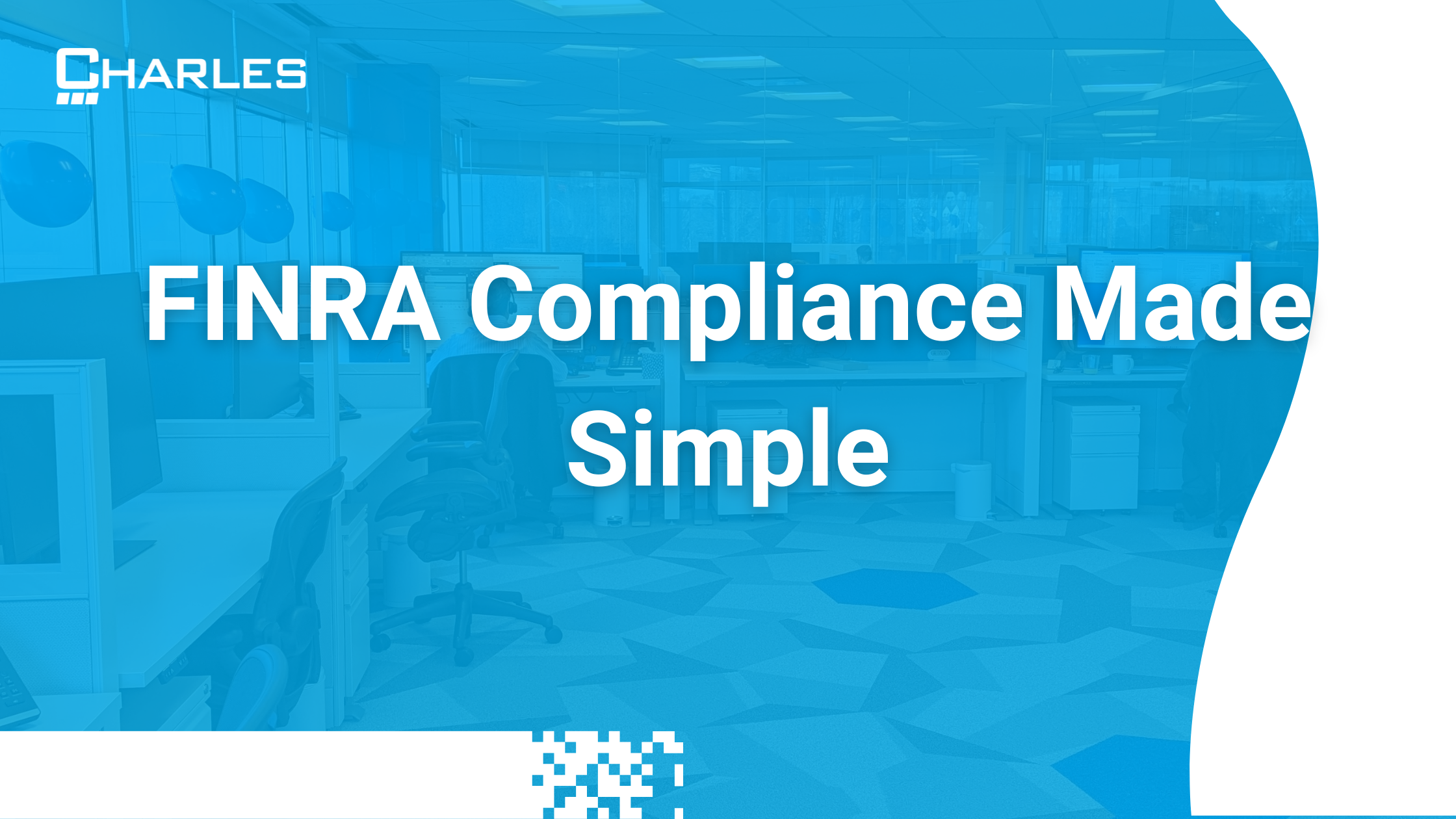
Introduction
If you work in the financial industry, you’re likely well aware of FINRA’s critical role in protecting investors, maintaining market integrity, and promoting fair and transparent practices in the securities industry. FINRA, which stands for the Financial Industry Regulatory Authority, is a regulatory body overseeing the financial sector in the United States. Although it is an independent, non-governmental organization, FINRA is authorized by Congress to establish and enforce the rules and regulations governing brokerage firms, securities professionals, and the securities markets. Its primary goal is to encourage confidence in the financial markets while safeguarding investors against fraud, misconduct, and unfair practices.
Whether you were already familiar with FINRA or just learned about it, many financial organizations face challenges in maintaining FINRA compliance. Staying compliant is essential not only to avoid legal penalties and hefty fines, but also to protect your customers’ private financial information and safeguard your firm’s reputation. Fortunately, Charles IT specializes in helping financial firms stay both secure and compliant. In this blog, we’ll explore FINRA compliance requirements, the challenges financial firms encounter, how Charles IT supports compliance efforts, and why technology is your greatest ally in achieving compliance.

Understanding FINRA Compliance Requirements
To achieve FINRA compliance, financial firms must first understand the key requirements involved. For IT, there are three critical areas organizations must focus on:
- Data Protection and Cybersecurity Measures
Protecting private financial data is a major factor in FINRA compliance. Financial firms must implement cybersecurity measures to secure both their organization and their clients. These include:
-
- Vulnerability Scanning: Identifying and mitigating internal and external network security risks.
- Multi-Factor Authentication (MFA): Safeguarding sensitive systems by requiring multiple verification steps to prevent unauthorized access.
- Network Monitoring: Continuously monitoring activities to detect and address potential risks, especially for users with elevated risk profiles.
- Vulnerability Scanning: Identifying and mitigating internal and external network security risks.
- Record Retention and Secure Communication
Accurate record-keeping and secure communication are vital for compliance audits and protecting sensitive data. Firms should implement:
-
- Encryption: Securing data in transit and at rest to prevent unauthorized access or interception.
- Cybersecurity Awareness Training: Educating employees on recognizing threats, such as phishing attempts, using advanced training tools like simulations.
- Access Monitoring: Implementing tools to detect and alert on suspicious behavior, ensuring data is only accessed by authorized personnel.
- Encryption: Securing data in transit and at rest to prevent unauthorized access or interception.
- Business Continuity and Disaster Recovery Planning
Being prepared to respond to and recover from cyber incidents is essential for maintaining operations and minimizing damage. Financial firms should have in place:
-
- Backup and Disaster Recovery: Performing regular backups of critical data and establishing a plan for restoring it in case of a breach or disaster.
- Incident Response Plan: Developing clear, documented procedures for handling cybersecurity incidents effectively.
- Data Loss Prevention (DLP): Using tools to discover, monitor, and enforce policies to prevent the loss or misuse of sensitive information.
- Backup and Disaster Recovery: Performing regular backups of critical data and establishing a plan for restoring it in case of a breach or disaster.
Failing to meet FINRA compliance standards can result in serious consequences, including:
- Financial Penalties: Hefty fines and sanctions from regulatory authorities.
- Reputational Damage: Loss of trust and credibility, potentially leading to losing clients and a competitive disadvantage.
- Operational Disruptions: Increased regulatory scrutiny and audits, causing interruptions to daily operations.
- Legal Consequences: Exposure to lawsuits or enforcement actions.
- Loss of License or Registration: Being barred from operating in the securities industry due to non-compliance.
By addressing these requirements, financial firms can not only meet FINRA standards but also protect their clients and business reputation.
Challenges Financial Firms Face in Achieving Compliance
While no financial firm wants to face the consequences of non-compliance, many encounter significant challenges that hinder their ability to meet all FINRA requirements. These obstacles often stem from:
- Complex and Evolving Regulations
FINRA regulations are inherently complex, especially for firms unfamiliar with cybersecurity requirements. To make matters more challenging, these regulations are constantly evolving. Even once your firm becomes familiar with FINRA, staying updated on regulatory changes can be overwhelming. Missing even a small detail, accidentally or otherwise, can lead to serious consequences, as outlined earlier. With updates to FINRA compliance expected in 2025, staying informed and proactive is more important than ever.
- Limited In-House IT Resources or Expertise
Many financial firms have limited in-house IT resources, and even those with IT teams often lack the specialized expertise required for compliance. While internal IT staff may manage day-to-day cyber issues effectively, compliance involves a higher level of complexity. It requires a team experienced in the specific regulatory standards your industry must follow, such as FINRA compliance. Partnering with a managed service provider (MSP) can provide access to the expertise needed to ensure that nothing is overlooked and that compliance is maintained effectively.
- Growing Cyber Threats
As compliance requirements evolve, so do the tactics used by cybercriminals to target financial firms. Staying ahead of these growing threats is a constant battle, as they can severely jeopardize your business. Key threats include:
- Phishing: Fraudulent communications, often via email or text, that appear to come from legitimate sources. These aim to steal sensitive data, such as login credentials, or install malware on devices.
- Ransomware: A type of malware that encrypts data, rendering it inaccessible until a ransom is paid to the attacker.
- Insider Threats: Risks posed by individuals within the organization who misuse their authorized access—either intentionally or unintentionally—to harm the company.
Overcoming these challenges requires a combination of expertise, proactive planning, and technology solutions to protect your firm.
.png?width=271&height=271&name=Jan%20Blog%201%20-%20FINRA%20Compliance%20Made%20Simple%20%20(1).png)
How Charles IT Helps Financial Firms Stay FINRA-Compliant
Of course, meeting FINRA requirements while addressing the challenges of compliance can feel overwhelming. But it doesn’t have to be! Partnering with a managed service provider (MSP) like Charles IT can simplify the process since we offer expertise and tailored solutions that help your financial firm not only achieve but also maintain FINRA compliance. Here's how:
- Managed Compliance Services
Charles IT provides comprehensive managed compliance services to ensure your firm meets all IT-related FINRA requirements. From vulnerability assessments to compliance audits, we identify gaps, implement corrective measures, and continuously monitor your systems to maintain adherence. Our team keeps up with regulatory updates, so you don’t have to, ensuring your firm stays compliant even as FINRA requirements evolve.
- Cybersecurity Solutions
Charles IT delivers cybersecurity measures tailored to your FINRA needs such as:
-
- Cybersecurity Awareness Training: Teach your team to become the first line of defense against cyber threats. Through ongoing training and phishing simulations, we help employees recognize and respond to risks, reducing the likelihood of human error.
- Data Encryption: Ensure sensitive financial information remains secure with advanced encryption solutions that protect data in transit and at rest. By making your data unreadable to unauthorized users, we help you safeguard your clients' privacy.
- Access Controls: Prevent unauthorized access to your systems with role-based access controls and multi-factor authentication. These measures ensure that only authorized personnel can access sensitive information, reducing the risk of internal and external threats.
- Network Monitoring: Our 24/7 network monitoring services proactively identify and address vulnerabilities, ensuring your systems remain secure. With real-time alerts and rapid incident response, we help minimize downtime and prevent breaches before they occur.
- Cybersecurity Awareness Training: Teach your team to become the first line of defense against cyber threats. Through ongoing training and phishing simulations, we help employees recognize and respond to risks, reducing the likelihood of human error.
- Disaster Recovery Planning
Charles IT also helps your firm prepare for the unexpected with disaster recovery and business continuity planning. We design and implement:
-
- Regular Data Backups: Ensuring sensitive information is securely stored and recoverable.
- Incident Response Plans: Establishing clear protocols for addressing cybersecurity events.
- Disaster Recovery Simulations: Testing your response plans to ensure they are effective in real-world scenarios.
- Regular Data Backups: Ensuring sensitive information is securely stored and recoverable.
These measures minimize downtime and protect your firm’s reputation in the event of an incident.
- vCISO Services
For financial firms needing strategic guidance, our virtual Chief Information Security Officer (vCISO) services offer expert support tailored to your industry. A vCISO provides:
-
- POAM and SSO Updates: We ensure your Plan of Action and Milestones (POAM) and System Security Plans (SSO) are regularly reviewed and updated to reflect your firm’s evolving compliance and security needs.
- Policy Creation, Review, and Updates: Our team develops, reviews, and refines your firm’s IT policies to ensure they align with FINRA regulations and industry best practices.
- Third-Party/Vendor Risk Assessments: We evaluate the security practices of your third-party vendors to identify potential vulnerabilities and mitigate risks that could impact your compliance.
- Annual Internal Risk Assessments: Conducting thorough internal risk assessments helps uncover and address gaps in your IT and compliance framework, ensuring your firm remains proactive against emerging threats.
- Audit Assistance and Liaison Services: We act as your trusted partner during audits, providing support and serving as a liaison to streamline communication with regulatory bodies and auditors.
- Monthly Meetings: Regularly scheduled meetings with your dedicated vCISO provide actionable insights, ongoing strategy adjustments, and progress updates to keep your firm on track.
- POAM and SSO Updates: We ensure your Plan of Action and Milestones (POAM) and System Security Plans (SSO) are regularly reviewed and updated to reflect your firm’s evolving compliance and security needs.
Partnering with Charles IT means gaining a trusted ally in navigating FINRA compliance. Let us handle compliance so you can prioritize growth and client satisfaction.
Technology as a Compliance Ally
Leveraging modern IT solutions has no doubt revolutionized how financial firms approach compliance though, making it both easier and more cost-effective. According to a study by Deloitte, 89% of compliance professionals agree that technology is vital in enhancing compliance programs, while CaseWare International highlighted that organizations using technology for compliance experienced a 63% boost in productivity.
By adopting advanced technologies, financial firms can automate tedious compliance processes, reduce human error, and ensure consistent adherence to FINRA requirements. For example, artificial intelligence (AI) streamlines compliance by analyzing vast amounts of data, detecting anomalies, and flagging potential risks in real time.
In terms of how modern IT tools provide secure record-keeping, encrypted communication, and proactive monitoring, here’s how they work:
- Secure Record-Keeping: Compliance-ready solutions ensure that critical records are stored securely, accessible for audits, and protected against unauthorized access. Automated retention schedules help firms meet regulatory requirements without the risk of data loss.
- Encrypted Communication: Encryption technology protects sensitive data, ensuring client information remains confidential and inaccessible to hackers. This is particularly crucial for safeguarding email and other forms of communication.
- Proactive Monitoring: Advanced monitoring tools allow firms to track network activity, identify suspicious behavior, and respond to potential threats before they escalate. Real-time alerts help IT teams minimize downtime and risk.
Conclusion
All in all, achieving and maintaining FINRA compliance is no small feat, but with the right managed service provider (MSP) by your side, your financial firm can gain a full understanding of the requirements and overcome every challenge that arises.
As demonstrated by Charles IT’s comprehensive FINRA-focused services, partnering with us can set your firm up for success. We help safeguard your reputation and ensure you avoid the costly consequences of non-compliance.
Don’t wait, schedule a consultation with Charles IT today to assess your firm’s compliance readiness and explore tailored IT solutions that meet FINRA regulations.
Want more information on FINRA before you book a call? Download our eBook, "FINRA Compliance: How to Enhance Your Firm's Cybersecurity" now!





